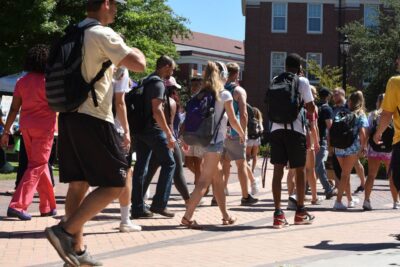Elevating student employment experience to a high-impact practice
Mary Anderson
Director, Career Services, The College of St. Scholastica
The views and opinions expressed are those of the author and do not necessarily represent the views or opinions of EAB.
Federal work study programs have been prevalent on college campuses since the 1960’s when they were established to provide part-time employment for students from low-income families. The programs and financial commitment have continued at the federal, state, and institutional level, and have grown in scope and outcomes to include skill-building and contributing to the community.
These well-intentioned student employment programs currently face a number of challenges, including the recent trend of students opting for off-campus work with higher wages. In addition, tighter budgets may have higher education administration questioning the costs of student employment. A student employee supervisor focus group held as part of this project illuminated supervisors’ view that student employees are often lacking some workplace skills. These skills overlap with the competencies identified by the National Association of Colleges and Employers as competencies needed for a career-ready workforce.
These challenges present an opportunity for colleges and universities to rethink the role and scope of student employment. My project proposes a solution to elevate the student employment experience to mimic other high-impact practices with the goal to not only address some of the identified challenges but improve student engagement and career success.
Colleges and universities have embraced integrating high-impact practices with the student experience to improve deep learning and a focus on engagement gains. While student employment is not currently included in the list of high-impact practices, I suggest that we can use this research to create training and resources to replicate components of other high-impact practices.
Project components:
- Professional development modules will be created within our learning management system on topics that match career readiness competencies including communication, professionalism, critical thinking and teamwork.
- A second set of training modules will be provided for students to guide and support students to effectively articulate to employers, through resume, cover letters and interviewing, the skills they have developed in student employment roles.
- A small group of student employment supervisors will be gathered in the fall to brainstorm and develop training to support supervisors in areas including: effectively providing feedback, recognition, and incorporating intentional reflection conversations.
- We will investigate the Iowa GROW model of intentional check-in meetings with our students with a focus on helping the student connect experiences in the classroom with student employment roles and to future career goals.
Guided by great research and resources (listed below) and the accountability of both my capstone partner and EAB structure, I am excited to move forward with this exciting project.
Resources
- McClellan, George S., et al. A Good Job: Campus Employment as a High-Impact Practice. Stylus Publishing, LLC, 2018.
- Kuh, G. D. (2008). High impact educational practices: What they are, who has access to them, and why they matter. Washington, DC: Association of American Colleges and Universities. ISBN: 978-0-9796181-4-7
- What Is Career Readiness?
- “A Brief History of the Federal Work-Study Program.” Campus Compact.
- “Statement by the President upon Signing Bill to Strengthen the College Work-Study Program.” Statement by the President Upon Signing Bill To Strengthen the College Work-Study Program. | The American Presidency Project, 7 Sept. 1967.
- Uistudentlife. “Iowa GROW®.” Division of Student Life.
More Blogs

A winning platform for higher education in a high-scrutiny era

Five trends that give community colleges a surprising edge in 2026
